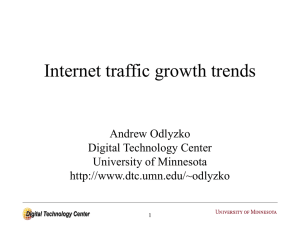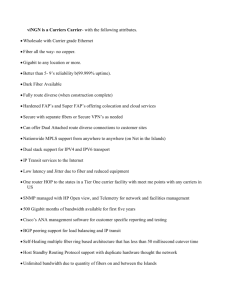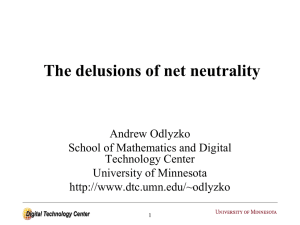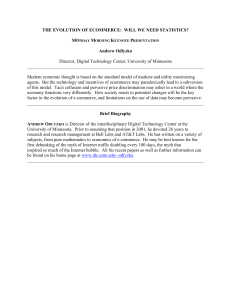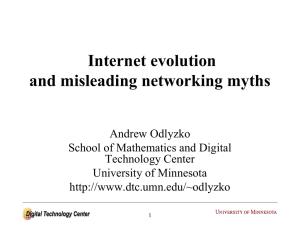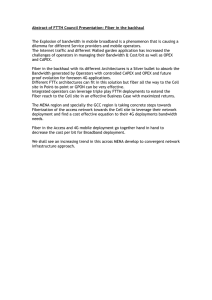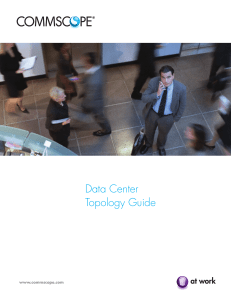Measurements and Mismeasurements and the Dynamics of Data Traffic Growth Andrew Odlyzko
advertisement
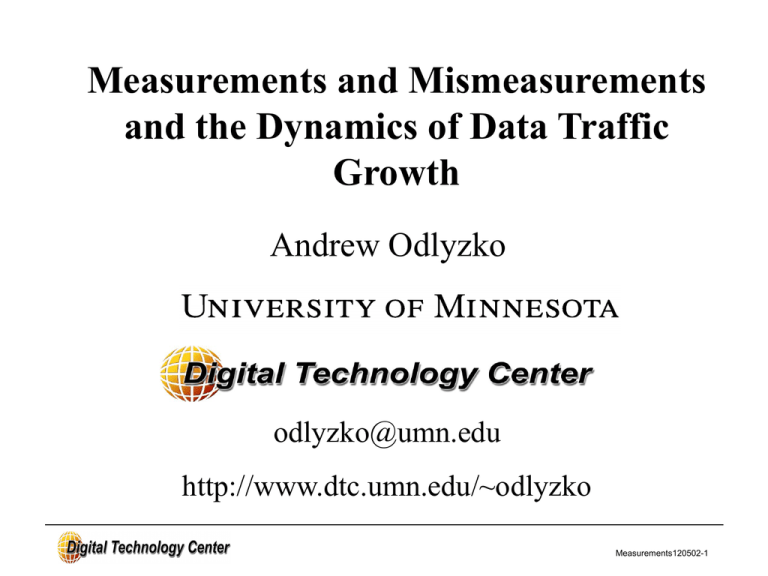
Measurements and Mismeasurements and the Dynamics of Data Traffic Growth Andrew Odlyzko odlyzko@umn.edu http://www.dtc.umn.edu/~odlyzko Measurements120502-1 Cause of telecom crash Technology successfully met the challenge posed by unrealistic business plans that were formulated in willful disregard of real demand • Huge excess of long haul fiber (from now on should be thought as a free resource) • Lesser excesses in optical and routing markets, combined with technological obsolescence, mean less severe problems. Measurements120502-2 From year-end 1997 to year-end 2001 (U.S. only) • • • • long distance fiber deployment: fiber miles growth of 5x transmission capacity: DWDM advances of 100x cumulative fiber capacity growth of around 500x actual demand growth: around 4x Two fundamental mistakes: (i) assume astronomical rate of growth for Internet traffic (ii) extrapolate that rate to the entire network Measurements120502-3 Bandwidth and Growth Rate of U.S. Long Distance Networks, year-end 1997 Percent of total Bandwidth Growth Rate 45% Voice 10% 45% Private line, ATM, FR 40% 10% Internet 100% Source: Coffman and Odlyzko, “The Size and Growth Rate of the Internet”, 1998 Measurements120502-4 Internet growth hype: “… bandwidth … will be chronically scarce. Capacity actually creates demand in this business…bandwidth-centric names are good values at any price since nobody can predict the true demand caused by growth.” -- Jack Grubman, April 1988 “Over the past five years, Internet usage has doubled every three months.” -- Kevin Boyne, UUNET COO, September 2000 “If you are not scared, you do not understand” -- Mike O’Dell, UUNET Chief Scientist, May 2000 Measurements120502-5 Blatant implausibilities in Internet bubble stories Mike O’Dell, May 2000 <http://stanford-online.stanford.edu/optic/main.html> Audio presentations: claimed consistent 10x annual growth Slides: domestic UUNET network: growth only 7x mid – 1997 mid – 1998 mid – 1999 5,281 OC12-miles 38,485 “ 268,794 “ Extrapolating back using 10x annual growth: 5 OC12-miles 2,000 T1-miles in mid-1994 ????? Measurements120502-6 Long history of techno bubbles and associated promoters Between 1837 and 1845 inclusive, there were gentlemen who rode in their carriages and kept fine establishments, who were called ‘traffic takers’. He stumbled over one of these gentlemen in 1844, who was sent to take the traffic on a railway called the Manchester and Southampton. It did not go to Manchester and it did not go to Southampton; but it was certainly an intermediate link between these places. This gentleman went to a place in Wilts where there was a fair, and there took the number of sheep on the fair day, and assuming that there would be the same number all the days of the year, he doubled or trebled the amount for what he called ‘development’ and the result was that he calculated that by sheep alone the Manchester and Southampton line would pay 15 percent. Measurements120502-7 Long history of technology leading to overinvestment and crashes 5000 4000 3000 Mileage 2000 1000 18 33 18 35 18 37 18 39 18 41 18 43 18 45 18 47 18 49 0 Railways authorized by British Parliament (not necessarily built) Measurements120502-8 Traffic on Internet backbones in U.S. For each year, shows estimated traffic in terabytes during December of that year. Year 1990 1991 1992 1993 1994 1995 1996 1997 1998 1999 2000 2001 2002 TB/month 1.0 2.0 4.4 8.3 16.3 ? 1,500 2,500 - 4,000 5,000 - 8,000 10,000 - 16,000 20,000 - 35,000 40,000 - 70,000 80,000 - 140,000 Measurements120502-9 Internet bandwidth vs. potential fiber capacity 100,000 TB/month 300 Gbps 80–wavelength OC192 DWDM system 800 Gbps/fiber Telegeography 2002: in mid-2002, highest capacity Internet route (NYC – Washington): 140 Gbps 9/11 disaster reports: Verizon central office at 140 West Street in NYC had capacity of 3.6 million VGE 200 Gbps Measurements120502-10 Distribution of Internet costs: almost all at edges U.S. Internet connectivity market (excluding residential, web hosting, . . . ) $15 billion/year U.S. backbone traffic: 100,000 TB/month Current transit costs (at OC3 bandwidth): $150/Mbps Hence, if utilize purchased transit at 30% of capacity, cost for total U.S. backbone traffic: $2 billion/year Backbones are comparatively inexpensive and will stay that way! Measurements120502-11 Residential broadband costs: DSL and cable modem users: average data flow around 10Kb/s per user If provide 20 Kb/s per user, at current costs for backbone transit of $150 per Mb/s per month, each user will cost around $3/month for Internet connectivity. Most of the cost at edges, backbone transport almost negligible Measurements120502-12 Hollowing out of the core: • • • customer-owned networks network outsourcing similar to evolution of computer industry Transition to be accomplished in presence of • • • gross overcapacity in some sectors capital markets closed to telecom potentially disruptive technologies Measurements120502-13 “Moore’s Law” for data traffic: Usual pattern of large, well-connected institutions: approximate doubling of traffic each year Note: Some large institutions report growth rates of 30-40% per year, the historical pre-Internet data traffic growth rate Measurements120502-14 SWITCH traffic and capacity across the Atlantic Measurements120502-15 Traffic between the University of Minnesota and the Internet 1,000 GB/day 100 10 2000 1999 1998 1997 1996 1995 1994 1993 1992 1 Measurements120502-16 The dominant and seriously misleading view of data network utilization Measurements120502-17 Typical enterprise traffic profile: Demolishes myth of insatiable demand for bandwidth and many (implicit) assumptions about nature of traffic Measurements120502-18 Weekly traffic profile on an AboveNet OC192 link from Washington, DC to New York City: Measurements120502-19 Key Constraint: • Adoption rates of new services. “Internet time” is a myth. New technologies still take on the order of a decade to diffuse widely. Measurements120502-20 Streaming multimedia vs. file transfers File transfer for local storage and transfer to other devices the most natural evolution • • • Predicted long ago Confirmed by Napster, . . . Want high bandwidth for faster-than-real-time We all have residential broadband (using conventional definition of broadband) courtesy of regular mail! Current Internet costs do not threaten Blockbuster Measurements120502-21 Multimedia file transfers a large portion of current traffic, streaming traffic in the noise Internet traffic at the University of Wisconsin in Madison Measurements120502-22 Conclusion: • Internet traffic is growing vigorously • Internet bubble caused largely by unrealistic expectations, formed in willful ignorance of existing data • Main function of data networks: low transaction latency • QoS likely to see limited use • File transfers, not streaming multimedia traffic, to dominate Measurements120502-23 Additional data aid speculations: www.dtc.umn.edu/~odlyzko Measurements120502-24
